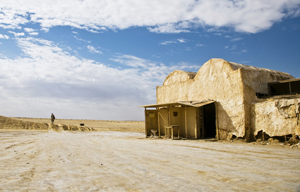About the author
More posts by Moderator
I have a vivid memory of a certain walk I took near the end of my four-year stay at the Institute in Basic Life Principles (IBLP) Headquarters campus. I was walking up the sidewalk, taking in the fresh air, and the most revolutionary thought crossed my mind: IBLP is just a small corner of the world. A great big world lay beyond our all encompassing little version of “utopia.”
 I wonder—or may I “marvel”?—how we expected those residing in the common world to find us on our little self-elevated mountaintop. And how we—who were so separated from the “world”—thought we had all the answers. Such a thought is now so appalling to me! The world is so great, the problems (on an individual, community, and global level) are so complex! And yet we—who were cloistered away—held the solutions in our hands. . . . ?!?!?!
I wonder—or may I “marvel”?—how we expected those residing in the common world to find us on our little self-elevated mountaintop. And how we—who were so separated from the “world”—thought we had all the answers. Such a thought is now so appalling to me! The world is so great, the problems (on an individual, community, and global level) are so complex! And yet we—who were cloistered away—held the solutions in our hands. . . . ?!?!?!
To say the least, the resulting world view of those who follow the teachings of IBLP and ATI is small, skewed, and grossly inaccurate.
As I stepped away from IBLP, I started picking up books about real world changers. Not one of these people claimed to hold the key to the answers of life. They just did what they could to make a positive difference where they were at—in their families, in their communities, throughout the world. They got involved. They didn’t withhold—they gave. They went down into the trenches, and got their hands dirty!
Since those initial few biographies (Condolezza Rice, Laura Bush, Gen. Colin Powell, and FSU coaching legend Bobby Bowden), my reading has diversified greatly. I’ve read about Ayaan Ali Hersi’s escape from an abusive home and culture in war-torn Somalia. Another book, Same Kind of Different as Me, tells of an unlikely friendship between a homeless man (Denver Moore) and high-end, international art dealer. I was humbled as I read about Mr. Moore’s lifelong struggle to simply survive. Truly, you cannot know someone’s life story by looking upon their current situation, let alone by their appearance (contrary to what we ATI students were taught).
Jean Hatzfeld’s books about the 1994 genocide in Rwanda, had a profound impact on me, especially Machete Season—a collection of personal experiences from about a dozen Hutu people (who were the aggressors in the massacre). For the Hutu people, it was literally kill (i.e., take an active part in the wiping out the Tutsi people) or be killed (you and your family). As I read, I wondered what I would have done in their situation. They took part in slaying their Tutsi neighbors—people whom they knew (and went to church with!) to protect and provide for their own families. The preservation of self and family—doesn’t that instinct lie within each of us? I know the moral code against killing. (God was pretty straight forward on that one!) But in the midst of great tumult, one’s ears filled with the cries and moans of the most recent victims—there’s got to be another battle raging within. The pull between the moral right and your own base instincts—not those drives that stem from a sinful nature, but those characteristics woven into the nature of our being.
If nothing else, that single quandary reminds me of how complicated real life really is. It’s not cut and dry. It’s not black or white. It’s messy. And there are so many “gray areas”—and countless shades of gray—it’s impossible to avoid them (as we were exhorted to do in the Basic Seminar).
We do not live in an ideal world; it is fallen. Neither can we create that ideal world. It seems those who hold to the teachings of IBLP and ATI, reject anything—or anyone—who is less than ideal (“ideal” as defined by a select few). And in doing so, I believe they reject the realities of living in this fallen world.
In this world, there is heartbreak and loss. The lines between right and wrong are sometimes blurred. Good people do bad things, and sometimes, seemingly bad people do good things. Some relationships last, some don’t regardless of how much time and effort one—or both—parties pour into it. Not ideal, but very real.
Most of the friends I made through ATI and IBLP have moved on with their lives, far beyond the confines of the Training Centers and that “cloister” mentality. We got a taste of real living—and we’re not looking back!
It's amazing and sad to me to look back and think that at the ripe age of 17 I thought I held the key to counseling those who were older and experienced real life. I went into the world thinking I knew the answers to succeed. And then life happened. It's been bittersweet to have those who I once pitied be the very people that have embraced me and held me up. I now realize that I know very little about life and the only answer I have is what Jesus said, Love God - Love others.
"the resulting world view of those who follow the teachings of IBLP and ATI is small, skewed, and grossly inaccurate." Yes.
[...] good. Of course we all want our lives to matter! Of course we all want to do something significant! Of course we all want to make an impact! So we run down this path only to eventually fall with exhaustion and, worse, [...]